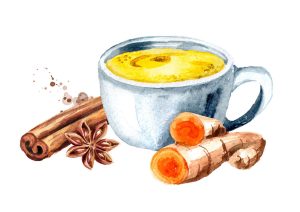In the last few years, turmeric has exploded in popularity among health and wellness enthusiasts. In reality, humans around the world have used the spice for over 4,500 years for seasoning food, dyeing clothes, reducing inflammation, and serving as an antiseptic.
Today, numerous studies have been conducted about these purported health benefits, and many show promising results. Current research suggests that turmeric — along with its active ingredient, curcumin — may reduce the risk of Alzheimer’s, fight and inhibit the growth of cancer cells, and alleviate joint pain from arthritis.
However, turmeric isn’t the same as curcumin. Thus, knowing the differences between the two is important to differentiate an expensive fad from an actual supplement for joint health.

Golden milk is a popular beverage made from turmeric that originates from India.
What is Turmeric?
Turmeric is a vibrant, golden-hued spice native to South Asia. A member of the ginger family, you’ll find it ground and dried in the spice section of your local supermarket. Although it’s technically considered a food additive, people across South Asia have used it as a staple in traditional medicine for thousands of years.
Since then, turmeric has spread across the globe, arriving in China as a dye, in Japan as a tea, and as an antiseptic in Pakistan. In the U.S., you can find turmeric in virtually all corners of the supermarket, including ice cream, chips, snacks, juice, and more. However, it’s important to check the quality and origin of your supplement, as some turmeric brands have been found to contain lead.
Only recently has Western medicine been interested in the potential health properties of turmeric. Research has pinpointed turmeric’s most active ingredient to be curcumin, the proposed source of turmeric’s anti-inflammatory and antioxidant properties.
What is Curcumin?
Curcumin is an antioxidant that gives turmeric its vibrant, golden color. As the principle “active” molecule, it has been researched many times over for its anti-inflammatory effects, especially for certain types of arthritis, including rheumatoid and osteoarthritis.
Turmeric, however, only contains trace amounts of curcumin, about 3% by weight.1 Nevertheless, both turmeric and curcumin supplements are available for those who prefer one or the other. In terms of safety, the U.S. Food and Drug Administration has declared curcumin as “Generally Recognized As Safe.”
How Do Turmeric and Curcumin Help Relieve Joint Pain?
Studies have shown that curcumin may have a variety of health benefits. Some suggest that turmeric/curcumin reduces the presence of pro-inflammatory proteins called cytokines, reducing inflammation in the joints of some study participants. Other studies suggest that curcumin blocks 5-LOX and COX-2, both of which are pro-inflammatory enzymes.
The overall research suggests that curcumin may be used to lower arthritis patients’ dependence on OTC and even prescription nonsteroidal anti-inflammatory drugs (NSAIDs), such as:
- Ibuprofen (Advil)
- Naproxen (Aleve)
- Aspirin
- Celecoxib (Celebrex)

Should You Take Turmeric or Curcumin for Your Arthritis?
Like most issues surrounding your health, it depends upon what your doctor thinks is best. Per the FDA, curcumin is generally recognized as safe and turmeric is used in all types of foods. However, it’s important to remember that turmeric is still considered a supplement — not a drug or treatment regimen.
While curcumin shows promising results in reducing inflammation and thus joint pain, it is still not fully proven to treat any illness, condition, or disease. Additionally, both turmeric and curcumin may have interactions with blood-thinning medications, like warfarin. Before starting this or any other supplement, have a conversation with your arthritis specialist to see if it is right for you.
You could also consider treatment options like those offered at Arthritis Relief & Vascular Centers. While supplements will always have their place in a health and wellness regimen, our specialists offer scientifically proven medical treatments for arthritis joint pain and inflammation. The specialists at Arthritis Relief & Vascular Centers have real solutions to your pain problems. To schedule your appointment with Arthritis Relief & Vascular Centers, give us a call at (855) 910-9195.
Sources: